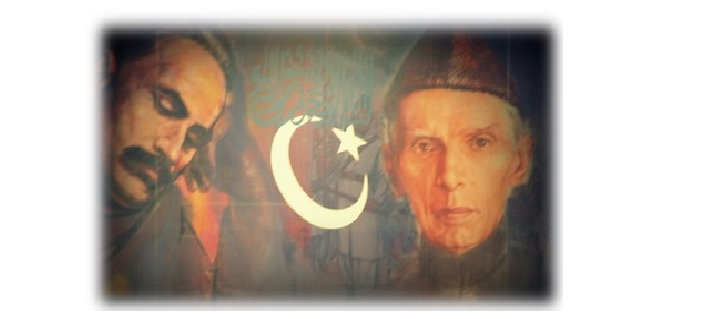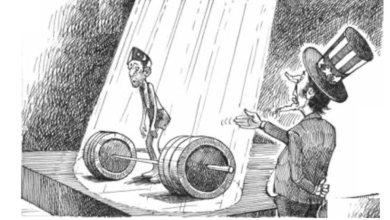Tracing the Lost Destination
Pakistan’s Future: Lessons from the Past
Forgetting great personalities is not easy, but we have made an art of it. What we do in relation to Iqbal Day, December 25th, and August 14th is clear evidence of our individual and collective “artistic abilities.” However, what exactly do we do on these days? We lavish praise on Iqbal and Quaid-e-Azam and passionately discuss the value of Pakistan, but our praise and enthusiasm are merely a facade for our indifference and spiritual, psychological, emotional, and intellectual laziness. We do not praise Iqbal and Quaid-e-Azam because we understand them, but because we do not want to understand them. The meaning is clear: praise them and be done with it. But great personalities do not let us off so easily; hence, the anniversaries of Iqbal and Quaid-e-Azam, the Independence Day of the homeland, and the day of the Lahore Resolution return every year to ask us, “What of your praise?”
And we respond collectively, “You are indeed great, and you are truly magnificent.” And with that, we move on. And what about the fervour we display on August 14th? It reminds us of the hustle and bustle of the stock exchange. You misunderstand—this is not a criticism of the stock exchange, but praise.
But why do we not want to understand great personalities? At the beginning of August, dear Shakir Qureshi insisted that we should dedicate the entire month of August to consciously understanding Pakistan. We should thoroughly discuss the historical reality of Pakistan, the facts surrounding its creation, our responsibilities as citizens of Pakistan, our shortcomings, and our future course of action. We should renew our commitment to building a bright and progressive Islamic Pakistan. In this regard, he demanded a series of two lectures each week, and I am delighted to write that the participants in these sessions, from various countries, were highly aware and determined to make a difference. Through their questions, the series has gradually found its way and continues to progress.
Great personalities operate on a different principle—they cannot be treated like “off-the-shelf” suits that you buy, wear, and go. Such a suit might be too loose in some areas and too tight in others. The sleeves might be too short or too long, but we don’t mind such things. If the sleeves are long, we roll them up; if they are short, we shrink our shoulders a bit, and convince ourselves that the suit fits perfectly. But great personalities are not like pre-made suits. To truly understand them, you must unravel the fabric and re-stitch it. This task is not difficult, but the biggest challenge is that in doing so, we ourselves become unravelled, and we suddenly realize how inadequate we are. In this sense, every great personality tells us that our growth has stagnated. Move forward and seek growth. This process is so painful that even the best of us cannot endure it, so we settle for praise—excessive praise. For instance, “Iqbal is Iqbal, Iqbal is ours,” and “O Quaid-e-Azam, your favour is a great one.” These are all good things, necessary things. There is some love in them, but the question is: Iqbal is ours, but are we also Iqbal’s? And where in our lives is the beauty that reflects Quaid-e-Azam’s favour? How then can we understand what Quaid-e-Azam’s favour truly is? Words are easy to recite; even parrots can learn them by heart. There must be some difference between us and parrots—after all, we claim to be human and the best of creation.
There is a very simple tool to understand people, especially great personalities. To understand a person, you don’t need a lot of information or knowledge. You don’t need a diploma from any school, college, or university. This tool can be obtained almost for free in common terms. It is
known as love. This tool is so powerful that through it, you can understand an entire personality just by looking at a picture. Some pictures of Iqbal, Quaid-e-Azam, and Maulana Maududi are such that they reveal all the hidden secrets. However, this understanding is often general and not detailed. But if one continues to reflect, the details gradually unfold. The problem is that in today’s world, this tool is scarce; otherwise, we would see even still images speaking to us.
Do not some of Quaid-e-Azam’s pictures clearly reveal the true source of his strength? But what is that source? Solitude and detachment. A solitude and detachment that creates gatherings and societies, and yet remains alone among them. But this is not a barren solitude. It is the “point of convergence” between connection and detachment—a rare thing. Ghalib has said:
ہے آدمی بجائے خود اک محشر خیال
ہم انجمن سمجھتے ہیں خلوت ہی کیوں نہ ہو
Man, himself is a tumult of thought,
Why do we consider solitude even when in a crowd?”
This is the other side of the coin of solitude and detachment. Understanding humans and life on the level of thought is important, but even more important is understanding them on the level of experience. Without this, humans, life, and even great historical events do not fully come into our grasp. We have drifted far from the essence of Iqbal, Quaid-e-Azam, and our history. We haven’t let go of anything, but it feels as though we hold nothing in our hands, except for volumes of information and knowledge. All of this is very important, very valuable. But more important than all of this is the touch of connection, the warmth of love—the warmth that transforms information into knowledge and knowledge into love, turning it into awareness. What more can be said in the context of August? When I look back, I see where the nations that gained independence with us or after us stand, and where we stand? I am drenched in the water of shame! I pray to Allah that this series of renewed commitments will lead us to a path of remedy, and that while tracing our lost path, we at least determine our correct direction. Ameen.
سچ اچھا ، پر اس کے جلو میں،ز ہر کا ہے اک پیا لہ بھی
پاگل ہو؟ کیوں نا حق کو سقراط بنو، خا مو ش ر ہو
حق ا چھا، پر اس کیلئے کو ئی اور مرے تو اور ا چھا
تم بھی کو ئی منصور ہوجو سو لی پر چڑ ھو؟ خا موش ر ہو
گرم آنسو اور ٹھنڈی آہیں، من میں کیا کیا موسم ہیں
اس بگیا کے بھید نہ کھو لو، سیر کرو ، خا موش ر ہو
آنکھیں موند کنا رے بیٹھو، من کے ر کھو بند کواڑ
انشا جی لو د ھا گہ لواور لب سی لو ،خا موش رہو
The truth is good, but with it comes a cup of poison
Are you mad? Why become a Socrates for no reason—stay silent
The truth is good, but it’s better if someone else dies for it
Why should you, too, be a Mansoor and get crucified—stay silent
Hot tears and cold sighs—what seasons dwell within the heart
Do not unravel the mysteries of this garden—enjoy it—stay silent
Close your eyes and sit by the shore—keep the doors of the heart shut
Insha Ji, take a thread and sew your lips—stay silent






